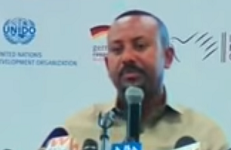Ethiopia’s Prime Minister Abiy Ahmed said his country will not be destabilized or turned into small nations by its enemies’ destructive intentions and actions.
“There are many forces who wants to see artificial rail, artificial sun and artificial wind to be blown in Ethiopia. These forces have armed themselves and stood to make Ethiopia small nations. We on the contrary are telling them that we will build big agro-industries. We shall see which idea will be the winner through time,” Prime Minister Abiy Ahmed said on Sunday morning at the inauguration of Bure Integrated Agroindustry Park in Ahmhara Region of Ethiopia.
Bure Integrated Agroindustry Park among others hosts Fibela Industry Complex, which also began operation and has the capacity to meet 60 percent of Ethiopia’s edible oil demand. In his speech Prime Minister Abiy urged the people of Ethiopia not to taken such artificial winds and fake negative stories about Ethiopia. If the people of Ethiopia are taken by such artificial winds and stories, it will be difficult to build a strong common nation for all the people of Ethiopia.
“If Ethiopia continues its journey with what it is currently doing, it will become world’s diplomacy and political center,” he said, urging the people of Ethiopia to be wise and not to be instrument for those destructive forces, who fear that if Ethiopia continues its unity and economic development, it will become a strong nation in the region economically and politically.
He further noted that though there are issues Ethiopians can argue within themselves, but such dialog and disagreement shouldn’t pave the way for those who are working to endanger the sovereignty of the Ethiopia as an independent nation. “Indeed Ethiopia will not be destabilized / ruined. For the past three thousand years, Ethiopia exceeds many countries s of the world in terms of practicing trade, agriculture and diplomacy.
“When we asses why these yesterday born countries are trying to dictate and destabilize us, these countries know that if this country (Ethiopia) rich in history returns into its previous leading position, it will be unstoppable,” he noted.
Admitting the failure of Ethiopians so far to sustain such rich history of the country by transforming the lives of the farmers by introducing poor farmers with modern farming techniques and tractors, Abiy urged the public to work towards changing the lives of these farmers.
“We will make our enemies to realize once again that we are untouchable when we provide tractors for our farmers, help them supply their produces to agro-industries, and generate hard currencies by exporting the produces of the agro-industries,” he said, advising those who are and have been working to destabilize Ethiopia for thousands of years but failed to change their destructive paths and stand by the side of hardworking Ethiopians who are committed to change their lives for good.
Growing tension
Currently Ethiopia, which has never been colonized is at loggerheads with two of former British colonies – the neighboring Sudan and Egypt over the use of its Abbay River, which feeds over 84 percent of the water to the trans-boundary Nile River.
The downstream countries of the Nile mainly Sudan and Egypt, have not been happy about the new hydroelectric dam (Great Ethiopian Renaissance Dam – GERD), which the country began construction about a decade ago. The two countries have been complaining that GERD, which will hold 74 billion cubic meters of water will reduce the amount of water they used to get from Abbay River. Though negotiations have been going on under the Nile Basin countries, which involves other half a dozen countries in the basin for about a decade, Sudan and Egypt refused to ratify the decisions refusing to faire distributions of the water among the riparian countries.
Egypt mainly has been insisting on the colonial agreements it has made in 1958, which shared 100 percent of the Nile water between Sudan and Egypt ignoring Ethiopia that contributes 84 percent of the water to the longest river in the world.
As Ethiopia approaches to start filling water GERD last July as it’s the first phase plan of completing the filling in four years, Egypt took the issue to the UN Security Council, which later referred it back to the African Union.
Recent reports from Ethiopia have also been implicating Egypt for fueling ethnic tensions in Ethiopia and supporting different armed groups. Sudan, which keeps changing its position over water filling of GERD, has recently invaded parts of Ethiopia moving in some 40 kilometers. Justifying its move Sudan has claimed that it has taken back its territory, which has been under Ethiopian farmers for about 25 years.
Opposing the action of Sudanese army, Ethiopian government, which admitted that there was border related issues between the two countries, urged Sudanese army to leave the area and continue discussions under the umbrella of the join border commission which has been in place.
Ethiopia claimed that the Sudanese army has used Ethiopian army’s military engagement with the Tigray Peoples Liberation Front (TPLF), which attacked the northern command of the army in Tigray region as an opportunity and vacuum to enter Ethiopian territory.
Within a few months TPLF has lost most of its leaders the whole territory of Tigray by the counter attack of Ethiopian army. Prime Minister Abiy Ahmed’s Sunday comment came in the middle of such developing political and military tensions in East Africa.
– Follow Us on Twitter https://twitter.com/newBuz_Ethiopia
– Subscribe to our Youtube https://www.youtube.com/c/Newbusinessethiopia/featured
– Find us on Facebook https://www.facebook.com/newBusinessEthiopiacom/
– Find us on LinkedIn https://www.linkedin.com/company/newbusinessethiopia
– Find us on Telegram https://t.me/EthiopianExclusiveBusinessNews
